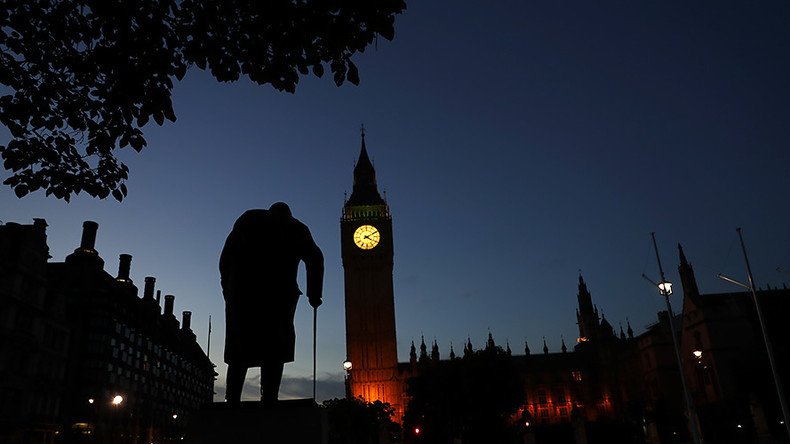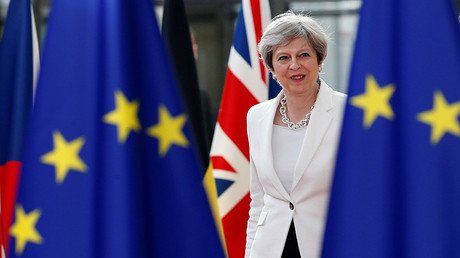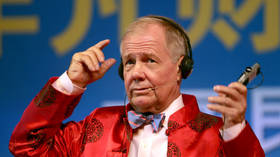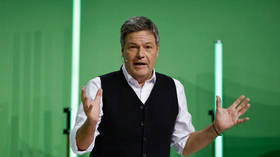Brexit gamble: EU can wait until UK ‘shoots itself in the foot’

The UK basically is negotiating with a gun to its head, Frances Coppola, economist, told 'News with Ed' program. It leaves the EU on March 29, 2019, whether it has got a deal or not, she added.
One year has passed since the UK voted to leave the European Union.
However, negotiations between Britain and the EU are still underway, and will continue to be for quite some time.
The question remains, however: Who is in the better position during the talks?
RT: Where is the negotiation power in this Brexit debate right now? Who has the upper hand?
Frances Coppola: Firmly with the EU and it always has been. The UK basically is negotiating with a gun to its head. It leaves the EU on March 29, 2019, whether it has got a deal or not; it is up against time pressure. It is a weakened part of the negotiations, but we should remember it is the UK that initiated this. All the EU has to do is sit tight and wait for the UK to shoot itself in the foot.
RT: Some economists say they are very good at analyzing why something is the way it is, but they are not good at telling you about what’s going to happen tomorrow. Would you agree?
FC: That is certainly true. I am not attempting to predict what the economic outcome will be. We were talking earlier about the possible cost of this or the benefits. I am not attempting to predict that. I think it is extremely dangerous to try to project that far into the future and say: ‘Oh, my goodness, it is going to be terrible,’ or ‘Oh, my goodness it is going to be marvelous.’ The reality is probably in the middle. But it is hard to predict. But in terms of looking at where the power balance lies, I am not looking ahead; I am looking where we are now. As far as I can see, it is the EU holding upper hand here.
RT: You use this game theory to explain simply what’s really going on here behind the doors. Could you tell RT about it?
FC: It is basically about saying that you can think of as being, if you like, a game of poker, or something like that. You got to look at the relative strength of the players’ positions. Who is it who really holds the power? Who is it who can afford to walk away? I know there’s been much said about the UK being able to walk away from these negotiations. But in reality it’s the EU that can afford to walk away, not the UK.
RT: What do you think about Chancellery Philip Hammond really addressing the timeline here?
FC: He’s been talking about what he calls a gentle slope into Brexit, which is quite nice. It is about the idea that we’re going to try and avoid a disorderly exit, a cliff age, a sudden change, which I think creates a much more certain and much gentler move into I guess what is uncharted territory than it could be. The problem is it is probably going to take a long time. So he is talking about some extended timeline.
RT: The EU will give them three years under their jurisdiction. Do you think he’s really addressing that kind of timeline? What does it mean if they don’t reach that?
FC: I think he is listening to that and saying: 'The EU is holding us a half-open door here, which allows us to extend the timeline, though we have to do it according to the EU’s rules,' which means a period of time when the UK’s effectively still in the single market and still subject to the jurisdiction of the European Court of Justice (ECJ) and required to operate according to free movement rules and all those things that apparently we want to stop. I think the problem he’s got is not with the EU, it’s a problem with his own party.
RT: Were you in favor of the UK leaving? And if the vote came up again, would you vote the same?
FC: No, I wasn’t. I would vote the same, yes.
RT: If the EU economically turns against the UK you’re not going to get a very good deal, especially if you don’t have a very strong Prime Minister and you don’t have the political power. There is a chance of economic isolation if it’s not done properly, isn’t there?
FC: I think the big risk here is actually not to manufacturing. I think the bigger risk is to services. The UK is a services-based economy and has been for a long time. I know we trashed all manufacturing industry in the 1980’s. In fact, services were bigger part of the UK economy even then. So it is the service industry…
The statements, views and opinions expressed in this column are solely those of the author and do not necessarily represent those of RT.













